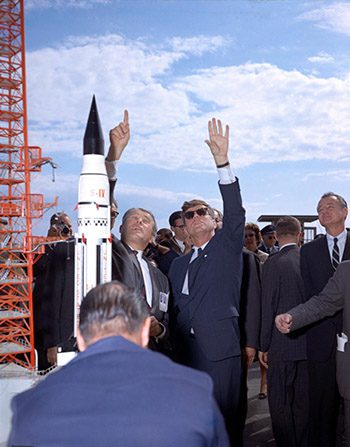Kennedy’s Space Vision
By • May 24, 2017 0 1101

JFK made quite an impact on my life, even though he’s the only president of the last 50 years I never met.” So tweeted Buzz Aldrin, the second man to walk on the moon. The iconic image of Aldrin on the lunar surface is the summation of Project Apollo.
In a 50th-anniversary tribute to the May 25, 1961, speech by President John F. Kennedy, Aldrin saluted JFK’s vision and added his own: “the establishment of permanent human presence on the surface of Mars by 2035.”
The Apollo 11 astronaut was following the Kennedy bravado, articulated in two major speeches.
The president’s lunar aspirations, wrapped in the romantic verbiage of space exploration, were secured by pragmatism as well. Knowing that some found the race to the moon too expensive — or plain “nuts,” as President Eisenhower once uttered — Kennedy wanted everyone involved to understand the benefits, too.
Following the April 1961 orbital flight of Soviet cosmonaut Yuri Gagarin, the first human in space, and, less than a month later, the first space travel by an American, Alan Shepard, Kennedy upped the ante. For national pride, security reasons and sheer love of exploration, he addressed Congress that May, saying:
“I believe that this nation should commit itself to achieving the goal, before this decade is out, of landing a man on the moon and returning him safely to the Earth. No single space project in this period will be more impressive to mankind, or more important for the long-range exploration of space; and none will be so difficult or expensive to accomplish.”
After John Glenn’s three orbits in February of 1962, Kennedy further outlined his vision for the space program in a speech at Rice University in September:
“We choose to go to the moon. We choose to go to the moon in this decade and do the other things, not because they are easy, but because they are hard, because that goal will serve to organize and measure the best of our energies and skills, because that challenge is one that we are willing to accept, one we are unwilling to postpone, and one we intend to win.”
“This is a great time to be thinking about President John Kennedy and his impact on the space program,” retired astronaut Scott Altman told us.
“As I write to you, I am at the Kennedy Space Center for the annual Astronaut Hall of Fame induction weekend, sitting under the shuttle Atlantis on display at the Visitor’s Center and realizing none of this would be here without Kennedy’s inspirational challenge to the nation,” wrote the Georgetown resident, a former space shuttle commander.
“Every time I hear those words — ‘We choose to go to the Moon, and do the other things, not because they are easy but because they are hard’ — I get goosebumps. I think JFK captured the essence of what it is to be an American and to want to explore, to do more, to challenge ourselves to be better than we are. My career in spaceflight was built on the inspiration President Kennedy provided when he challenged us to fly to the moon — ‘before this decade is out’ — and the fact that we responded to that challenge and achieved it!”
Apollo was a technological and government program that succeeded beyond its Space Race origins. While its scientific benefits were apparent, its psychological breakthrough was just as powerful. Mythologist Joseph Campbell said Apollo forever changed our view of ourselves in the cosmos with its never-seen-before image of an earthrise over the lunar horizon.
On July 20, 1969, the slain president’s goal was achieved, with Neil Armstrong and Buzz Aldrin affirming: “The Eagle has landed … That’s one small step for [a] man, one giant leap for mankind.”
The moon landings ended in 1972. Had we reached for the stars too soon, too dramatically — then pulled NASA budgets back to earth? Have the space shuttle, the space station, the Hubble telescope and unmanned spacecraft elicited the same kind of fascination as did Apollo? In a few years, NASA will get a new opportunity with the Orion manned missions. Their ultimate destination: Mars.
When that goal is reached, old-timers who recall watching live TV from the moon on that summer night in 1969 will look up to the fourth planet — and again to the 35th president — and see our world anew.

